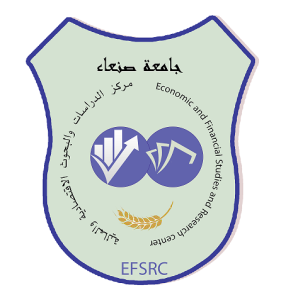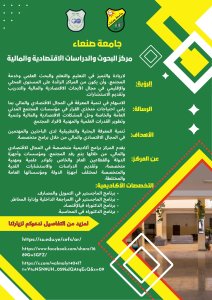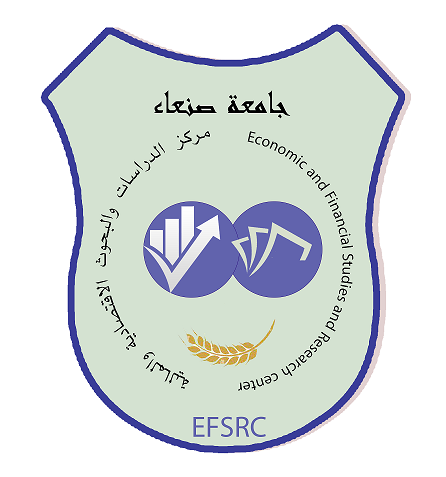Master's Program in Finance and Banking
Economic and Financial Studies and Research Center (EFSRC)

Program Overview:
The Finance and Banking program aims to provide students with all the necessary academic knowledge within their specific field of specialization. Furthermore, all students will be equipped with the scientific and practical skills required by the current and future needs of the local and international job market. The program will also support academically outstanding students and prepare them to pursue doctoral studies in their chosen specialization. To achieve these goals, the program will rely on a highly qualified faculty with advanced academic ranks. Modern scientific technologies will be utilized in the curriculum, and a mentorship plan will be implemented for postgraduate students to ensure they acquire scientific knowledge within their field of specialization. Continuous emphasis will be placed on applied research as a fundamental graduation requirement. The curriculum will be subject to ongoing monitoring and review, including the addition or removal of courses and modifications to course content to keep pace with continuous scientific and global developments. In addition, students will participate in scientific seminars and visits to banks and financial institutions to enhance their experience, skills, and scientific and practical capabilities.
Veiw
Leadership and excellence in education, learning, scientific research, and community service, aiming to be one of the leading centers at the local and regional levels in the fields of economic and financial research, training, and providing consultations.
Mission
Preparing and qualifying specialized scientific and research cadres in finance and banking to achieve quality and efficiency, while meeting the needs of banks, financial institutions, and insurance companies in the local and regional markets.
Goals
The program aims to:
Enhance students’ knowledge of fundamental concepts and theories in finance and banking.
Develop and enhance students’ academic abilities and practical skills in finance and banking.
Familiarize students with modern developments in finance and banking.
Employ high-quality, innovative teaching methods that keep pace with the latest advancements and foster students’ analytical, creative, and critical thinking skills.
Provide all necessary support for students to obtain internships in financial and banking institutions.
Develop students’ skills in technologies related to financial and banking institutions.
Enhance students’ ability to integrate theoretical knowledge with the professional aspects of finance and banking, thereby strengthening their required knowledge and skills.
Develop students’ skills in using scientific research tools to prepare and present reports and studies to decision-makers in financial institutions.

Courses Offered in the Program:
First: Remedial courses for the program: Applicants without academic administrative backgrounds must pass preparatory courses, which may be one or all of the following courses (depending on the decision of the admissions committee).
Course Title | الساعات المعتمدةCredit Hours | اسم المقرر | ||||
نظريةTh. | عمليةPr. | تمارينTut. | الإجماليTotal C.H | |||
1. | Banking Management | 3 | 3 | إدارة المصارف | ||
2. | Credit Management | 3 | 3 | إدارة الائتمان | ||
3. | Banking Operations Management | 3 | 3 | إدارة العمليات المصرفية | ||
4. | Money and Banking | 3 | 3 | نقود وبنوك | ||
Total Credit Hours | 12 | 12 | اجمالي الساعات المعتمدة | |||
Second: Compulsory courses
Course Title | الساعات المعتمدةCredit Hours | اسم المقرر | ||||
نظريةTh. | عمليةPr. | تمارينTut. | الإجماليTotal C.H | |||
1. | Theories of Money, Electronic Money, and Digital Money | 3 | 3 | نظريات النقود والنقود الإليكترونية والرقمية | ||
2. | Advanced Economic Analysis | 3 | 3 | التحليل الاقتصادي المتقدم | ||
3. | Advanced Banking Accounting | 3 | 3 | محاسبة بنوك متقدمة | ||
4. | Islamic Economics | 3 | 3 | اقتصاد اسلامي | ||
5. | Advanced Banking Operations Management | 3 | 3 | إدارة العمليات المصرفية المتقدمة | ||
6. | Financial Econometrics | 3 | 3 | الاقتصاد القياسي المالي | ||
7. | Risk Management and Bank Credit Analysis | 3 | 3 | إدارة المخاطر وتحليل الائتمان المصرفي | ||
8. | Research Methods and Approaches | 3 | 3 | أساليب ومناهج البحث العلمي | ||
Total Credit Hours | 24 | 24 | اجمالي الساعات المعتمدة | |||
Third: Elective courses (chosen by the department)
Course Title | الساعات المعتمدةCredit Hours | اسم المقرر | ||||
نظريةTh. | عمليةPr. | تمارينTut. | الإجماليTotal C.H | |||
1. | Contemporary Issues in Financial and Banking Institutions | 3 | 3 | قضايا معاصرة في المؤسسات المالية والمصرفية | ||
2. | Finance of Banks and Advanced Financial Institutions | مالية المصارف والمؤسسات المالية المتقدمة | ||||
3. | Corporate and Financial Institution Governance | حوكمة الشركات والمؤسسات المالية | ||||
4. | Financial Engineering and Stock Exchange Management | 3 | 3 | الهندسة المالية وإدارة البورصات | ||
5. | Advanced Banking Management (including Electronic and Digital Banking) | إدارة المصارف المتقدمة (تضم الصيرفة الإلكترونية والرقمية) | ||||
6. | Investment Portfolio Management | إدارة المحافظ الاستثمارية | ||||
Total Credit Hours | 6 | 6 | اجمالي الساعات المعتمدة | |||
Fourth: Master's Thesis
The student must prepare and discuss a scientific thesis worth (6) credit hours.
Graduate Qualifications:
Possesses extensive knowledge in their field of specialization.
Has practical skills relevant to their area of expertise and future work.
Capable of applying human or managerial knowledge to develop and enlighten the community and solve its problems.
Respects the ethics of their profession and the laws governing its practice.
Able to utilize modern technologies and apply them in their work.
Possesses positive work skills, collaboration, teamwork, responsible leadership, ethical commitment, self-confidence, self-reliance, and sound decision-making abilities.
Capable of acquiring another language relevant to their specialization.
Demonstrates critical thinking skills, scientific research abilities, and a commitment to continuous self-learning.
Possesses time management, crisis management skills, and the ability to handle work pressure.
Able to gather information from its sources, analyze and apply it, and present it systematically and in clear scientific communication.
Admission Requirements:
The applicant must hold a bachelor’s degree with a “Good” grade from a recognized Yemeni university or an equivalent institution in the following fields: Bachelor’s in Accounting, Economics, Banking Sciences, Management, or Management Information Systems.
The applicant must successfully pass a personal interview.
